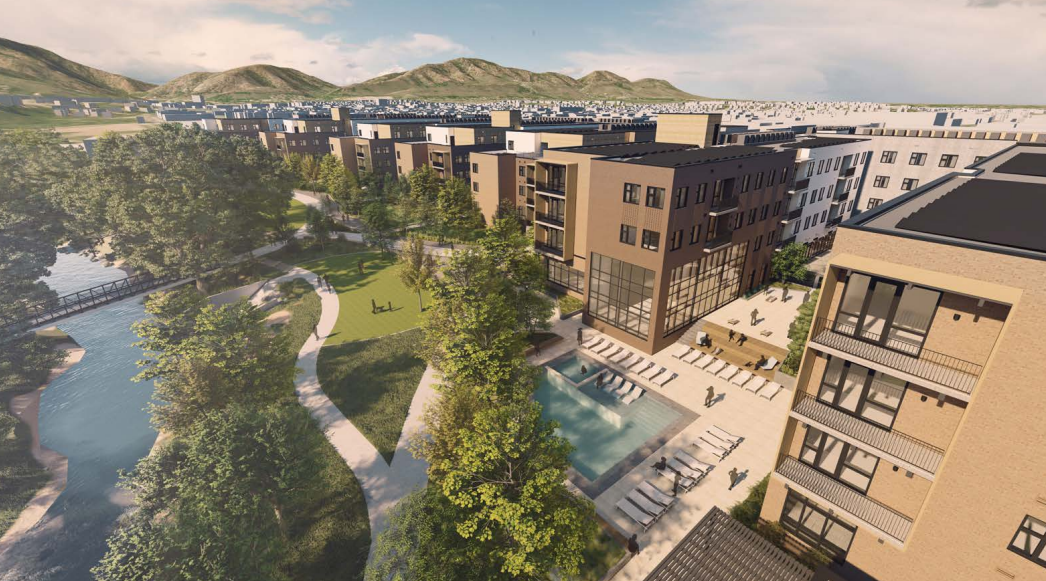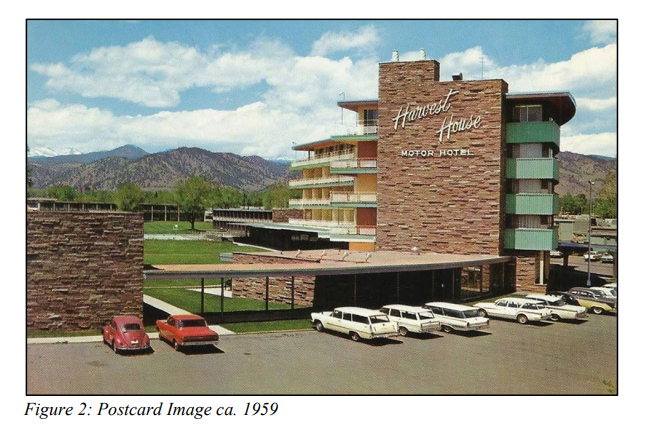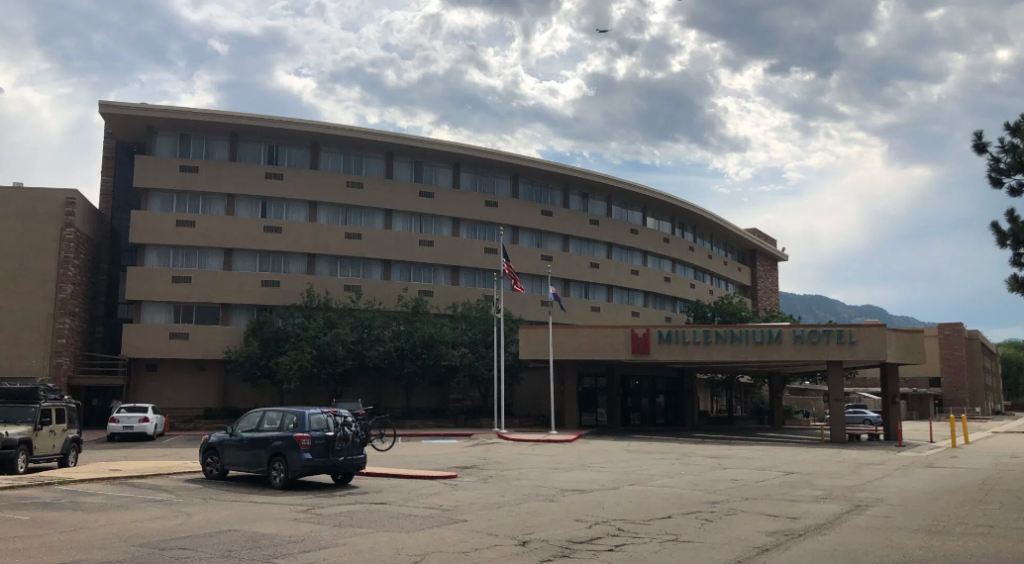Boulder Planning Board debates Millennium redevelopment
Proposal to redevelop hotel exposes rifts among planning officials

BOULDER — After three years of planning, six staff reviews, multiple hearings by city advisory boards and eight hours of deliberation over two Boulder Planning Board meetings in the last month, a developer’s proposal to transform the Millennium Harvest House hotel into housing for University of Colorado students still remains up in the air.
Boulder Planning Board members, after more than four hours of testy debate, punted an approval decision on the redevelopment plans put forth by Landmark Properties Inc., a Georgia-based builder specializing in student housing, to a special meeting to be held in August.
The contentious discussion — centered around a litany of complaints about the project that ranged from the size, scope and mass of the project to placement of curb cuts to pedestrian path maintenance — exposed sharp divisions among members of the Boulder Planning Board, which Boulder City Council relies on for recommendations and for approvals of certain development-plan submissions. Members accused others of lack of preparation and seemed to suggest that personal preference, rather than city code, was driving decision-making, a potentially problematic accusation should any official decision related to the Millennium Harvest House redevelopment project end up before a court.
SPONSORED CONTENT
How dispatchable resources enable the clean energy transition
Platte River must prepare for the retirement of 431 megawatts (MW) of dispatchable, coal-fired generation by the end of the decade and address more frequent extreme weather events that can bring dark calms (periods when there is no sun or wind).
After multiple failed 4-3 votes on amendments and conditions that could be placed on Landmark’s development plans, the Boulder Planning Board continued its deliberations on Tuesday to Aug. 8.
The proposal
Landmark, which began its planning process prior to the COVID-19 pandemic, intends to replace the aging Millennium Harvest House hotel adjacent to the CU campus at 1345 28th St. with three 4-story buildings containing 303 student-housing rental apartments — a mix of studio, one-, two-, three-, and four-bedroom units. The complex would have a total of 944 bedrooms.
“The proposal involves a modification to allow four-story buildings, approximately 53-feet in height where a maximum of three-stories and 35-feet in height is permitted by-right,” city planning documents show. In order to qualify for an increased height waiver, the project would have to demonstrate a community benefit, such as additional affordable housing or commercial space.
The project is not expected to include any on-site affordable housing, so Landmark would pay about $20 million into Boulder’s affordable-housing coffers, said Danica Powell, founder of Trestle Strategy Group and representative of Landmark.
“These are the kinds of projects that the Boulder Chamber is thrilled to see,” Jonathan Singer, the chamber’s senior director of policy programs, told planning officials this week.
Construction of more than 300 new rental units would lead to “decreasing pressure on single family homes,” which students have come to rely on due to lack of apartment options, he said. The project represents a unique “opportunity for students to live, study and work in the same place.”
History
The Harvest House Hotel, as it was known when it opened, was built in 1958.
“There’s a lot that’s happened here that’s very impressive and incredible” over its six-and-a-half decades, Powell said. For example, one of NASA’s Mercury Seven astronauts “Scott Carpenter came here after he went to outer space.”
The hotel was designed by Denver architect Ralph Peterson. But the city has approved its demolition because it holds little of its original architectural value due to the multiple modifications to the structure over the years, according to a Boulder planning memo.
“We have to honor our history, but honor that history in a way that provides a way for future generations to enjoy this (community),” Singer said.

Public space
Plans for the redeveloped property call for significant public amenities centered along Boulder Creek. The developer expects public improvements to cost about $7.5 million.
“We’ve really worked on differentiating the public space” to help activate Boulder Creek and adjacent open spaces, Powell said.
Landmark intends to re-align the Boulder Creek path behind the new apartment buildings to “create more of a public amenity,” Crosier said. The aim is to “create a destination along Boulder Creek path that’s publicly accessible, similar to the Civic Center area.”
Next to the re-aligned path, “we are creating about a half-acre open lawn area in the center of the site … (that) separates pedestrian and cycling traffic, creating a much nicer pedestrian edge along the creekside,” she said.
Additionally, the developer plans to build pickleball courts, half-court basketball court and a dog park that will be open to the public. “There will be certain limitations in use related to timing,” Crosier said, “but this will be a really great public amenity.”
The Millenium Harvest House property has quite a few mature trees, but many will have to be removed in order to grade the site. The entire center of the site needs to be raised in order to mitigate flooding, which greatly limits the number of mature trees that can be retained, Crosier said. But the developer plans to replace removed trees at a three-to-one ratio. Of course, those new trees will take decades to mature.
Regarding infrastructure improvements, the redevelopment project “proposal includes numerous transportation improvements including updates and realignment of the existing Boulder Creek multi-use path, new north-south multi-use path through the site, and the extension of Olson Drive as a new right-of-way connection at the north end of the site,” planning documents show.
Existing businesses
The hotel site is home to several “cottages,” which house local small businesses such as the Dream Makers Preschool and Single Track Mountain Bike Adventure. Landmark’s plans include the retention of these buildings and their tenants.
What the developer’s proposal does not include is the retention of the Rocky Mountain Tennis Center and its tennis bubble.
“We at Rocky Mountain Tennis Center know this project is happening, and, quite honestly, it needs to happen,” RMTC co-owner Kendall Chitambar said. “We know our time here is short.”
The developer and hotel operator have been “working directly with us to keep RMTC tennis going strong” while the redevelopment plans have been fleshed out and snaked through Boulder’s approval process, he said, “giving us much needed time to figure out our next steps.”
The culmination of those next steps: “Hopefully (moving) to a new site.”
A small office space occupied by RMTC would be maintained and offered as affordable commercial space to other local businesses, Powell said.
The Millenium Harvest House Hotel site also has an existing fish observatory built into the side of Boulder Creek. The plan is for this feature to remain when the apartments are built.
Parking

Because of the hotel site’s proximity to the University of Colorado campus, Landmark is betting that many student residents will not need a car.
The developer, according to planning documents, has requested a “52.2% vehicle parking reduction to allow for 348 parking spaces where 728 are required.”
Landmark representatives said the developer has created a plan to reduce tenants’ reliance on cars.
“Overall, the proposed alternative transportation strategy intends to increase the percentage of alternative travel modes and to decrease parking demand for the proposed residential land use on the site,” according to planning documents.
Elements of the plan include $75 per year to be paid to residents without cars to be used for transportation alternatives such as ride shares and free Eco Passes.
Many students will bike between home and campus, the developer expects. The apartment complex will provide “extra bike parking both indoors and outdoors, short and long term,” Powell said.
“Our goal is to help people understand that they don’t need a car when they get here and how to get around.”
The controversy
While the Boulder Planning Board offered a litany of concerns about the project, the most significant relate to the size, scale of the buildings and parking. Because Landmark is requesting a parking reduction and height waiver, some Planning Board members said the body has extra responsibility and extra authority in shaping elements of Landmark’s development plan.
Board members were nonplussed by the building design of Landmarks proposal, arguing that the buildings are too large, too tall, too long and too aesthetically uninteresting to properly represent the city, especially given the hotel site’s placement along a corridor that serves to welcome visitors entering and exiting the city onto U.S. Highway 36.
Sarah Silver, a member of the Planning Board, suggested that Landmark re-work its proposal into something “better designed, more human-scaled,” and board member Lisa Smith said simply that “this project is not ready.”
Planning Board member Jorge Boone said that there is sense among some on the board “that we’re not being listened to” regarding some of the massing and height design and aesthetic elements proposed by Landmark. “This is the entry and exit out of Boulder, and it is immensely frustrating that we are this far into this process and the developer has still not taken this concern in.”
The concern among some planning officials is that if Landmark is granted a parking reduction, residents will still bring cars and park them in adjacent neighborhoods. But Planning Board member Kurt Nordback said that “this (type request) is not out of the ordinary” compared with other student-housing projects that have requested similar parking reductions when compared using a unit-to-space ratio.
The board offered a series of conditions on Landmark’s plan meant to address these concerns, but none gained the requisite traction for approval.
Well into the third hour of deliberation Tuesday, Landmark managing director Andrew Costas said it appeared that the body had “run out of steam.” For a few minutes, the board seemed ready to vote on a denial of the plans — “It seems like a real loss for the project to end up with a denial because” members are tired and frustrated, Costas said — but ultimately opted to kick the can down the road another month.
It’s unclear whether the board will be able to come to a consensus before the next meeting, particularly because members are procedurally barred from discussing the matter with one another outside of public meetings.
“I just worry we’re going to end up in this same washing machine,” Silver said.
BOULDER — After three years of planning, six staff reviews, multiple hearings by city advisory boards and eight hours of deliberation over two Boulder Planning Board meetings in the last month, a developer’s proposal to transform the Millennium Harvest House hotel into housing for University of Colorado students still remains up in the air.
Boulder Planning Board members, after more than four hours of testy debate, punted an approval decision on the redevelopment plans put forth by Landmark Properties Inc., a Georgia-based builder specializing in student housing, to a special meeting to be held in August.
The contentious discussion — centered…
THIS ARTICLE IS FOR SUBSCRIBERS ONLY
Continue reading for less than $3 per week!
Get a month of award-winning local business news, trends and insights
Access award-winning content today!


